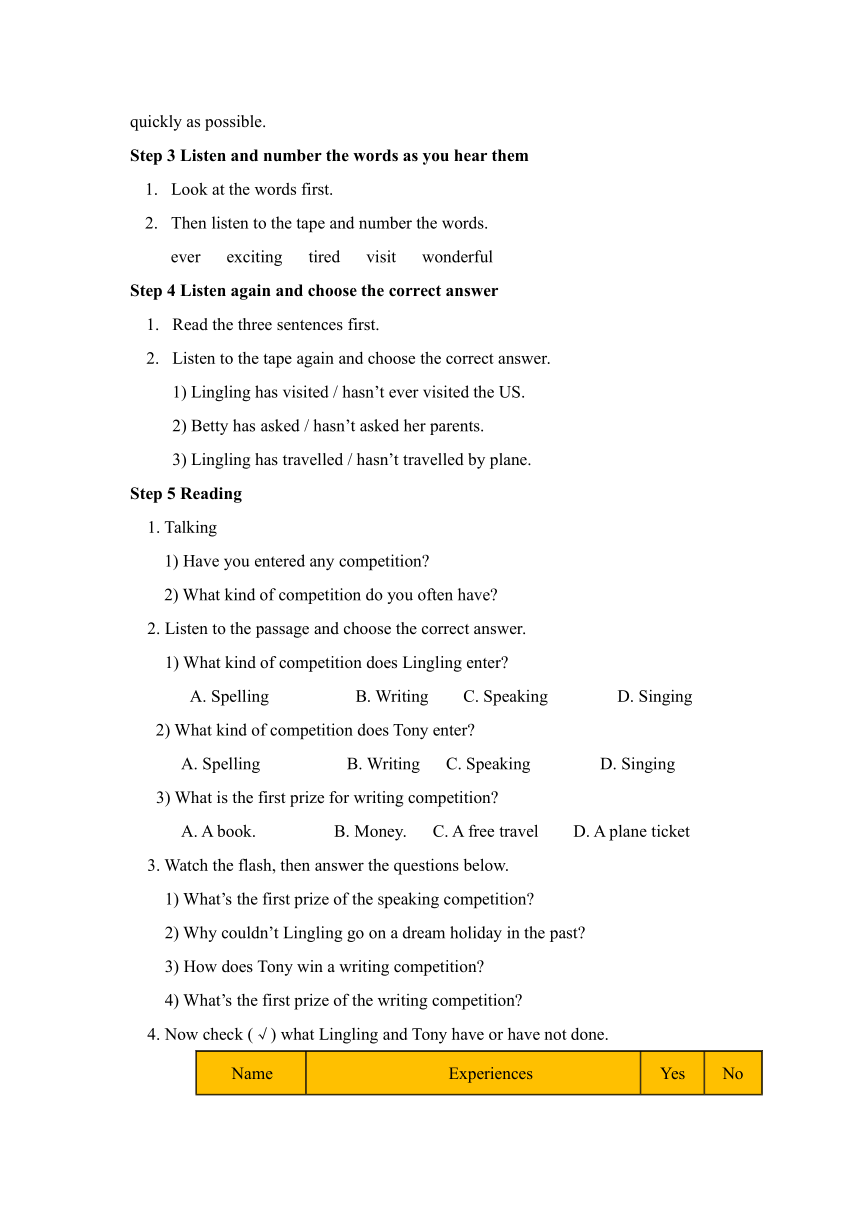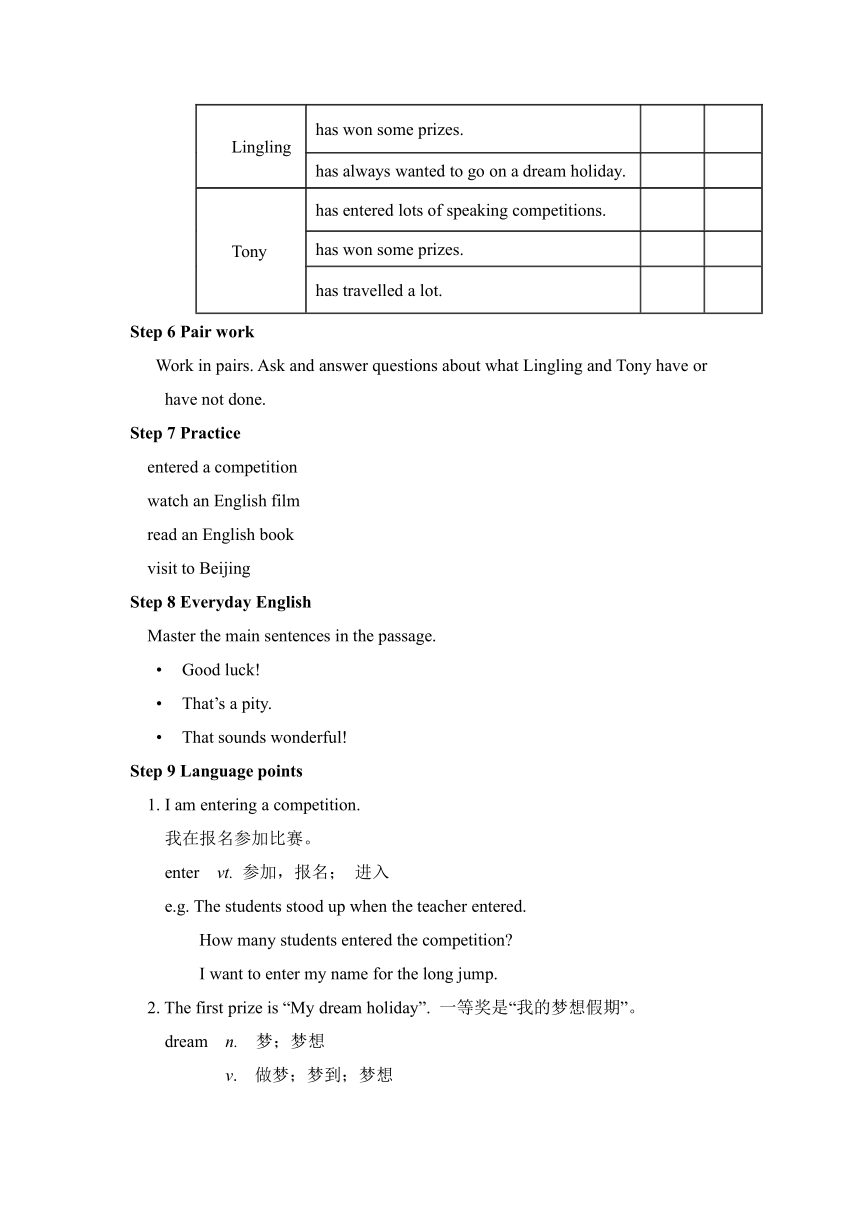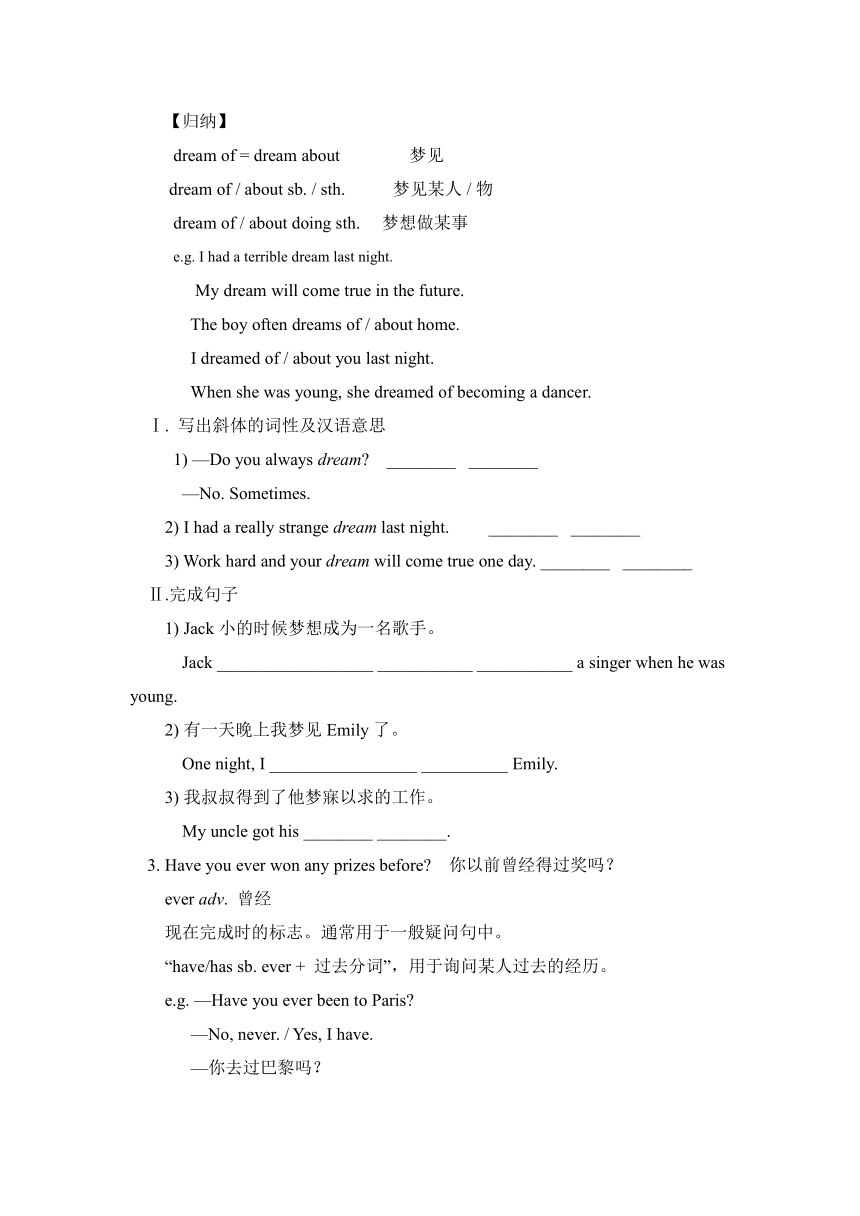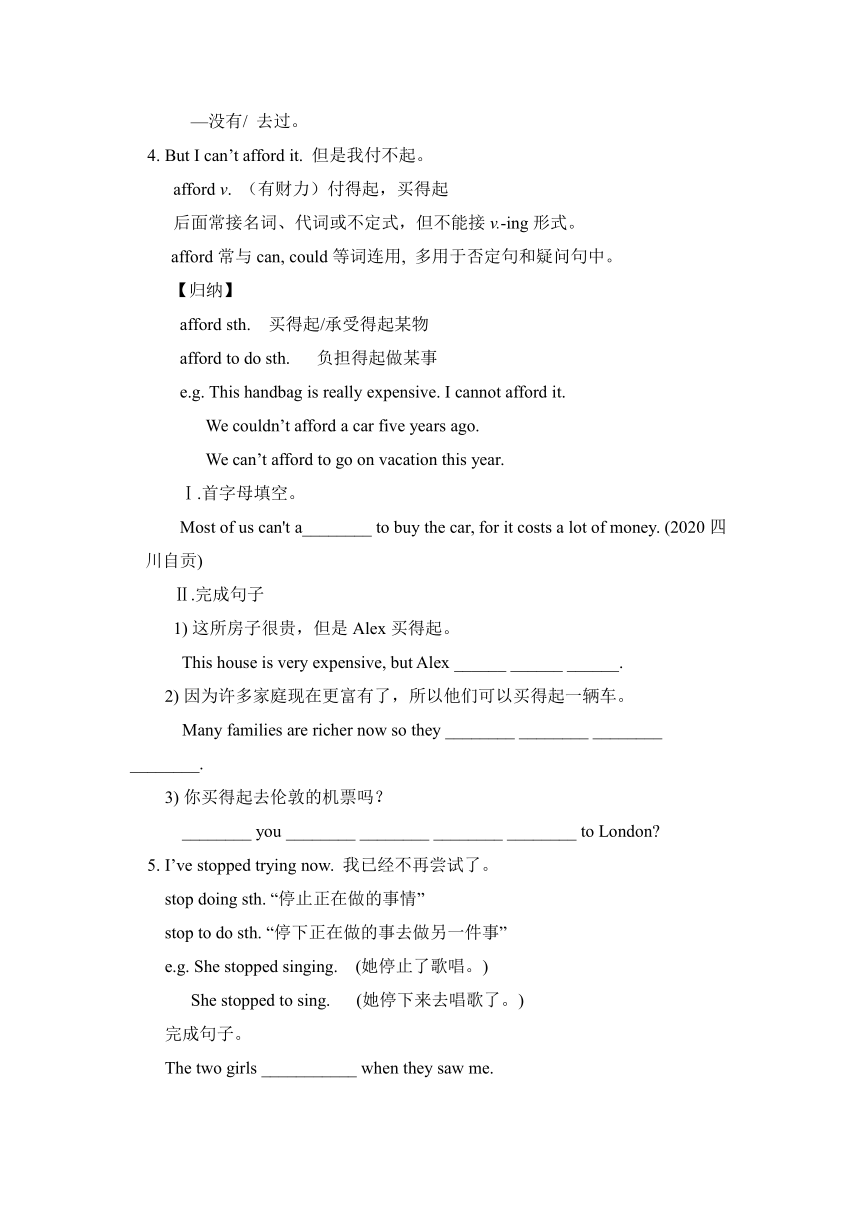Module 2 Unit 1 I’ve also entered lots of speaking competitions 教案 2023-2024学年外研版英语八年级下册
文档属性
| 名称 | Module 2 Unit 1 I’ve also entered lots of speaking competitions 教案 2023-2024学年外研版英语八年级下册 |

|
|
| 格式 | docx | ||
| 文件大小 | 26.4KB | ||
| 资源类型 | 教案 | ||
| 版本资源 | 外研版 | ||
| 科目 | 英语 | ||
| 更新时间 | 2024-02-24 00:00:00 | ||
图片预览





文档简介
Module 2 Experiences
Unit 1 I’ve also entered lots of speaking competitions.
【教材分析】
本课为Module 2的第一单元,主要内容为运用现在完成时来描述自己和他人的经历,例如演讲比赛经历、旅行经历等。从全书来看,本单元承接下一模块现在完成时的学习和运用,内容有层次的展开,学生容易接受。通过对本模块的学习,为下一模块的学习奠定了语言基础。
【教学目标】
1. 词汇: ever, enter, competition, prize, dream, afford, pity, invite
2. 现在完成时的结构和定义。
3. 能听懂和阅读关于介绍经历的语言材料,能通过相关词汇和图片描述自己和他人的经
历;能初步运用现在完成时,并写出相关的句子和短文。
4. 乐于介绍自己的经历,和他人分享。同时,学会倾听他人的美好的经历,理解他人的喜
怒哀乐,建立良好的人际关系。
【教学重点】
1. 重点短语和单词。
2. 现在完成时的运用。
【教学难点】
1. 现在完成时的结构运用。
2. 现在完成时的不规则动词。
【教学过程】
Teaching Procedures:
Step 1 Lead in
We all have experiences. Can you tell us some interesting experiences you have ever had
Step 2 Consolidate new words
Look and say. The teacher shows the new words and let the students to say as quickly as possible.
Step 3 Listen and number the words as you hear them
Look at the words first.
Then listen to the tape and number the words.
ever exciting tired visit wonderful
Step 4 Listen again and choose the correct answer
Read the three sentences first.
Listen to the tape again and choose the correct answer.
1) Lingling has visited / hasn’t ever visited the US.
2) Betty has asked / hasn’t asked her parents.
3) Lingling has travelled / hasn’t travelled by plane.
Step 5 Reading
1. Talking
1) Have you entered any competition
2) What kind of competition do you often have
2. Listen to the passage and choose the correct answer.
1) What kind of competition does Lingling enter
A. Spelling B. Writing C. Speaking D. Singing
2) What kind of competition does Tony enter
A. Spelling B. Writing C. Speaking D. Singing
3) What is the first prize for writing competition
A. A book. B. Money. C. A free travel D. A plane ticket
3. Watch the flash, then answer the questions below.
1) What’s the first prize of the speaking competition
2) Why couldn’t Lingling go on a dream holiday in the past
3) How does Tony win a writing competition
4) What’s the first prize of the writing competition
4. Now check (√) what Lingling and Tony have or have not done.
Name Experiences Yes No
Lingling has won some prizes.
has always wanted to go on a dream holiday.
Tony has entered lots of speaking competitions.
has won some prizes.
has travelled a lot.
Step 6 Pair work
Work in pairs. Ask and answer questions about what Lingling and Tony have or have not done.
Step 7 Practice
entered a competition
watch an English film
read an English book
visit to Beijing
Step 8 Everyday English
Master the main sentences in the passage.
Good luck!
That’s a pity.
That sounds wonderful!
Step 9 Language points
1. I am entering a competition.
我在报名参加比赛。
enter vt. 参加,报名; 进入
e.g. The students stood up when the teacher entered.
How many students entered the competition
I want to enter my name for the long jump.
2. The first prize is “My dream holiday”. 一等奖是“我的梦想假期”。
dream n. 梦;梦想
v. 做梦;梦到;梦想
【归纳】
dream of = dream about 梦见
dream of / about sb. / sth. 梦见某人 / 物
dream of / about doing sth. 梦想做某事
e.g. I had a terrible dream last night.
My dream will come true in the future.
The boy often dreams of / about home.
I dreamed of / about you last night.
When she was young, she dreamed of becoming a dancer.
Ⅰ. 写出斜体的词性及汉语意思
1) —Do you always dream ________ ________
—No. Sometimes.
2) I had a really strange dream last night. ________ ________
3) Work hard and your dream will come true one day. ________ ________
Ⅱ.完成句子
1) Jack小的时候梦想成为一名歌手。
Jack __________________ ___________ ___________ a singer when he was young.
2) 有一天晚上我梦见Emily了。
One night, I _________________ __________ Emily.
3) 我叔叔得到了他梦寐以求的工作。
My uncle got his ________ ________.
3. Have you ever won any prizes before 你以前曾经得过奖吗?
ever adv. 曾经
现在完成时的标志。通常用于一般疑问句中。
“have/has sb. ever + 过去分词”,用于询问某人过去的经历。
e.g. —Have you ever been to Paris
—No, never. / Yes, I have.
—你去过巴黎吗?
—没有/ 去过。
4. But I can’t afford it. 但是我付不起。
afford v. (有财力)付得起,买得起
后面常接名词、代词或不定式,但不能接v.-ing形式。
afford常与can, could等词连用, 多用于否定句和疑问句中。
【归纳】
afford sth. 买得起/承受得起某物
afford to do sth. 负担得起做某事
e.g. This handbag is really expensive. I cannot afford it.
We couldn’t afford a car five years ago.
We can’t afford to go on vacation this year.
Ⅰ.首字母填空。
Most of us can't a________ to buy the car, for it costs a lot of money. (2020四川自贡)
Ⅱ.完成句子
1) 这所房子很贵,但是Alex买得起。
This house is very expensive, but Alex ______ ______ ______.
2) 因为许多家庭现在更富有了,所以他们可以买得起一辆车。
Many families are richer now so they ________ ________ ________ ________.
3) 你买得起去伦敦的机票吗?
________ you ________ ________ ________ ________ to London
5. I’ve stopped trying now. 我已经不再尝试了。
stop doing sth. “停止正在做的事情”
stop to do sth. “停下正在做的事去做另一件事”
e.g. She stopped singing. (她停止了歌唱。)
She stopped to sing. (她停下来去唱歌了。)
完成句子。
The two girls ___________ when they saw me.
那两个女孩一见到我就停止了讲话。
The two girls _____________ when they saw me.
那两个女孩一见到我就停下来和我讲话。
6. That's a pity.
真遗憾。
pity n. 可惜;遗憾
It's a pity that ...结构
e.g. Li Jing didn't go to the dance party. That's a pity!
It's a pity that I can't go to your birthday party.
7. You can make it up. 你可以编(一个故事)。
make up 编造;创造;组成;构成
当其宾语为代词时,代词需放在make和up中间,并用其宾格形式。
e.g. The whole story is made up.
整个故事是虚构出来的。
make up 组成,构成
e.g. The three paragraphs make up a passage.
8. I will invite you to come with me.
我将邀请你和我一起来。
invite v. 邀请
invite sb. to do sth. 邀请某人去做某事
invite sb. to + 地点 邀请某人到某地
e.g. We invited all our friends.
Mr. Smith invited us to his birthday dinner.
We invited Dave to join the club.
Mr Green invited his friend to Canada.
根据汉语意思完成英语句子,每空一词。
1) 在会上,我们邀请他发言。
At the meeting, we _________ him _________ _________.
2) 我们应该邀请格林先生参加这个会议。
We should _________ Mr. Green _________ _________ _________.
Step 10 Complete the sentences with the correct form of the words in the box.
Let the Ss complete the sentences with the words in the box and then check with each other.
afford competition dream invite pity prize
1. Her _______ was to study at a good university one day.
2. When I was in school, I won many ______ for my writing.
3. You must enter the music ___________! You will beat everybody.
4. My family cannot _______ to buy a ticket for the match.
5. It is a(n) ______ that you did not come to see the film with us.
6. John _________ his new friends to his birthday party last week.
Step 11 Pronunciation and speaking
Read and predict which words the speaker is likely to stress.
Ss read and predict which words the speaker is likely to stress.
Now listen and check if it is right.
Work in pairs. Read the conversations aloud.
--Have you ever wanted to travel around the world
--Yes, I have. I’ve always wanted to travel around the world.
--Have you ever visited New York
--No, I haven’t. I’ve never visited the US.
--Have you ever entered a competition
--No, I haven’t. I haven’t entered any competitions.
Step 12 Grammar
现在完成时
现在完成时表示在以前某个时间已经发生的行为或曾经做过的事情对目前有某种影响,也可以表示到目前为止已经完成的事情。
谓语部分由“have / has+动词的过去分词”构成(第三人称单数形式用has, 其他人称用have)。
肯定句:“主语+have / has+动词的过去分词+其他”。
否定句:“主语+have / has +not+动词的过去分词+其他”
(have not=haven’t; has not=hasn’t)。
一般疑问句及简略回答:
“Have / Has+主语+动词的过去分词+其他 ”。
肯定回答:Yes, 主语(人称代词主格)+ have / has.
否定回答:No, 主语(人称代词主格)+haven’t / hasn’t.
规则动词过去分词的构成规则与规则动词过去式的构成规则相同。
1. 动词一般在词尾加“-ed”。
e.g. work → worked → worked
2. 以“e”结尾的动词,词尾加“-d”。
e.g. live → lived → lived
3. 以“辅音字母+ y”结尾的动词,将“y”变为“i”,再加“-ed”。
e.g. study → studied → studied cry →cried → cried
4. 以重读闭音节结尾,末尾只有一个辅音字母,先双写该辅音字母,再加“-ed”。
e.g. stop → stopped → stopped drop → dropped → dropped
不规则动词的过去分词变化需特别记忆。
e.g. be → was/ were → been
do →did → done
eat→ ate → eaten
go→ went → gone
see→ saw → seen
find→ found → found
have→ had → had
make→ made → made
let→ let → let
put→ put → put
Step 13 Summary
first prize 一等奖
make up 编写;创作
dream holiday 梦寐以求的假期
stop doing sth. 停止做某事
think about 考虑
invite sb. to do sth. 邀请某人做某事
Step 14 Exercises
Ⅰ. 根据语境及所给汉语提示语写出所缺单词。
1. My cousin Bill has never ________(邀请) me to his party.
2. Because of many other things, she missed two exciting ________(比赛).
3. Jill’s ________(梦想) is to be an English teacher when she grows up.
4. Tom has ________(曾经) had dinner in this restaurant.
5. Every year Mr Green ________(参加) over twenty basketball matches.
Ⅱ. 根据语境从方框中选择恰当的短语填空,有的需要变换形式,每个短语限用一次。
first prize, write about, make up, think about
1. Tom didn’t write a real story. He ____________ one.
2. —What did Ms Jones ask us to ____________
—She asked us to write an email about the school trip last week.
3. Lucy was very happy because she won ____________ in the maths competition.
4. Next, we should ____________ what to buy as Henry’s birthday present.
Ⅲ. 根据括号内的要求完成下列各题,每空一词(含缩略形式)。
1. Kate has asked her father about this problem. (改为否定句)
Kate ________ ________ her father about this problem.
2. I have met him at Bill’s party. (改为一般疑问句)
________ ________ ________ him at Bill’s party
3. Lingling is preparing for her trip to London. (对划线部分提问)
________ ________ Lingling ________
4. My aunt likes pop music. (对划线部分提问)
________ ________ ________ music does your aunt like
5. You don’t need to worry about him. (改为祈使句)
________ ________ about him.
Ⅳ. 根据汉语意思完成英语句子,每空词数不限。
1. 我爸爸年轻的时候不常旅行。
When my father was young, he didn’t _________________.
2. 他们买不起飞机票。
They can’t _________________.
3. 我没见到Mr King,那真是件遗憾的事。
I didn’t meet Mr King and _________________.
4. 我认为你不应该停止尝试新的东西。
I don’t think you should _________________ new things.
5. 你的故事不需要是真实的。
Your story doesn’t _________________ true.
Ⅴ. 根据对话内容从方框中选择能填入空白处的最佳选项补全对话。
A: Hey, Jane! (1)________
B: I’m preparing for the tennis match.
A: (2)________
B: No, I haven’t. I just want to enjoy it. Mike, you play tennis very well. (3)________
A: I’ve entered many tennis matches but ...
B: (4)________
A: I mean I’ve never got prizes.
B: What a pity! Can you play tennis with me I need your help.
A: (5)________
A. No problem. B. What are you doing C. What do you want to say D. Why don’t you enter the match E. Have you thought about winning first prize
Step 15 Homework
Write about your partner's experiences according to Activity 6
Unit 1 I’ve also entered lots of speaking competitions.
【教材分析】
本课为Module 2的第一单元,主要内容为运用现在完成时来描述自己和他人的经历,例如演讲比赛经历、旅行经历等。从全书来看,本单元承接下一模块现在完成时的学习和运用,内容有层次的展开,学生容易接受。通过对本模块的学习,为下一模块的学习奠定了语言基础。
【教学目标】
1. 词汇: ever, enter, competition, prize, dream, afford, pity, invite
2. 现在完成时的结构和定义。
3. 能听懂和阅读关于介绍经历的语言材料,能通过相关词汇和图片描述自己和他人的经
历;能初步运用现在完成时,并写出相关的句子和短文。
4. 乐于介绍自己的经历,和他人分享。同时,学会倾听他人的美好的经历,理解他人的喜
怒哀乐,建立良好的人际关系。
【教学重点】
1. 重点短语和单词。
2. 现在完成时的运用。
【教学难点】
1. 现在完成时的结构运用。
2. 现在完成时的不规则动词。
【教学过程】
Teaching Procedures:
Step 1 Lead in
We all have experiences. Can you tell us some interesting experiences you have ever had
Step 2 Consolidate new words
Look and say. The teacher shows the new words and let the students to say as quickly as possible.
Step 3 Listen and number the words as you hear them
Look at the words first.
Then listen to the tape and number the words.
ever exciting tired visit wonderful
Step 4 Listen again and choose the correct answer
Read the three sentences first.
Listen to the tape again and choose the correct answer.
1) Lingling has visited / hasn’t ever visited the US.
2) Betty has asked / hasn’t asked her parents.
3) Lingling has travelled / hasn’t travelled by plane.
Step 5 Reading
1. Talking
1) Have you entered any competition
2) What kind of competition do you often have
2. Listen to the passage and choose the correct answer.
1) What kind of competition does Lingling enter
A. Spelling B. Writing C. Speaking D. Singing
2) What kind of competition does Tony enter
A. Spelling B. Writing C. Speaking D. Singing
3) What is the first prize for writing competition
A. A book. B. Money. C. A free travel D. A plane ticket
3. Watch the flash, then answer the questions below.
1) What’s the first prize of the speaking competition
2) Why couldn’t Lingling go on a dream holiday in the past
3) How does Tony win a writing competition
4) What’s the first prize of the writing competition
4. Now check (√) what Lingling and Tony have or have not done.
Name Experiences Yes No
Lingling has won some prizes.
has always wanted to go on a dream holiday.
Tony has entered lots of speaking competitions.
has won some prizes.
has travelled a lot.
Step 6 Pair work
Work in pairs. Ask and answer questions about what Lingling and Tony have or have not done.
Step 7 Practice
entered a competition
watch an English film
read an English book
visit to Beijing
Step 8 Everyday English
Master the main sentences in the passage.
Good luck!
That’s a pity.
That sounds wonderful!
Step 9 Language points
1. I am entering a competition.
我在报名参加比赛。
enter vt. 参加,报名; 进入
e.g. The students stood up when the teacher entered.
How many students entered the competition
I want to enter my name for the long jump.
2. The first prize is “My dream holiday”. 一等奖是“我的梦想假期”。
dream n. 梦;梦想
v. 做梦;梦到;梦想
【归纳】
dream of = dream about 梦见
dream of / about sb. / sth. 梦见某人 / 物
dream of / about doing sth. 梦想做某事
e.g. I had a terrible dream last night.
My dream will come true in the future.
The boy often dreams of / about home.
I dreamed of / about you last night.
When she was young, she dreamed of becoming a dancer.
Ⅰ. 写出斜体的词性及汉语意思
1) —Do you always dream ________ ________
—No. Sometimes.
2) I had a really strange dream last night. ________ ________
3) Work hard and your dream will come true one day. ________ ________
Ⅱ.完成句子
1) Jack小的时候梦想成为一名歌手。
Jack __________________ ___________ ___________ a singer when he was young.
2) 有一天晚上我梦见Emily了。
One night, I _________________ __________ Emily.
3) 我叔叔得到了他梦寐以求的工作。
My uncle got his ________ ________.
3. Have you ever won any prizes before 你以前曾经得过奖吗?
ever adv. 曾经
现在完成时的标志。通常用于一般疑问句中。
“have/has sb. ever + 过去分词”,用于询问某人过去的经历。
e.g. —Have you ever been to Paris
—No, never. / Yes, I have.
—你去过巴黎吗?
—没有/ 去过。
4. But I can’t afford it. 但是我付不起。
afford v. (有财力)付得起,买得起
后面常接名词、代词或不定式,但不能接v.-ing形式。
afford常与can, could等词连用, 多用于否定句和疑问句中。
【归纳】
afford sth. 买得起/承受得起某物
afford to do sth. 负担得起做某事
e.g. This handbag is really expensive. I cannot afford it.
We couldn’t afford a car five years ago.
We can’t afford to go on vacation this year.
Ⅰ.首字母填空。
Most of us can't a________ to buy the car, for it costs a lot of money. (2020四川自贡)
Ⅱ.完成句子
1) 这所房子很贵,但是Alex买得起。
This house is very expensive, but Alex ______ ______ ______.
2) 因为许多家庭现在更富有了,所以他们可以买得起一辆车。
Many families are richer now so they ________ ________ ________ ________.
3) 你买得起去伦敦的机票吗?
________ you ________ ________ ________ ________ to London
5. I’ve stopped trying now. 我已经不再尝试了。
stop doing sth. “停止正在做的事情”
stop to do sth. “停下正在做的事去做另一件事”
e.g. She stopped singing. (她停止了歌唱。)
She stopped to sing. (她停下来去唱歌了。)
完成句子。
The two girls ___________ when they saw me.
那两个女孩一见到我就停止了讲话。
The two girls _____________ when they saw me.
那两个女孩一见到我就停下来和我讲话。
6. That's a pity.
真遗憾。
pity n. 可惜;遗憾
It's a pity that ...结构
e.g. Li Jing didn't go to the dance party. That's a pity!
It's a pity that I can't go to your birthday party.
7. You can make it up. 你可以编(一个故事)。
make up 编造;创造;组成;构成
当其宾语为代词时,代词需放在make和up中间,并用其宾格形式。
e.g. The whole story is made up.
整个故事是虚构出来的。
make up 组成,构成
e.g. The three paragraphs make up a passage.
8. I will invite you to come with me.
我将邀请你和我一起来。
invite v. 邀请
invite sb. to do sth. 邀请某人去做某事
invite sb. to + 地点 邀请某人到某地
e.g. We invited all our friends.
Mr. Smith invited us to his birthday dinner.
We invited Dave to join the club.
Mr Green invited his friend to Canada.
根据汉语意思完成英语句子,每空一词。
1) 在会上,我们邀请他发言。
At the meeting, we _________ him _________ _________.
2) 我们应该邀请格林先生参加这个会议。
We should _________ Mr. Green _________ _________ _________.
Step 10 Complete the sentences with the correct form of the words in the box.
Let the Ss complete the sentences with the words in the box and then check with each other.
afford competition dream invite pity prize
1. Her _______ was to study at a good university one day.
2. When I was in school, I won many ______ for my writing.
3. You must enter the music ___________! You will beat everybody.
4. My family cannot _______ to buy a ticket for the match.
5. It is a(n) ______ that you did not come to see the film with us.
6. John _________ his new friends to his birthday party last week.
Step 11 Pronunciation and speaking
Read and predict which words the speaker is likely to stress.
Ss read and predict which words the speaker is likely to stress.
Now listen and check if it is right.
Work in pairs. Read the conversations aloud.
--Have you ever wanted to travel around the world
--Yes, I have. I’ve always wanted to travel around the world.
--Have you ever visited New York
--No, I haven’t. I’ve never visited the US.
--Have you ever entered a competition
--No, I haven’t. I haven’t entered any competitions.
Step 12 Grammar
现在完成时
现在完成时表示在以前某个时间已经发生的行为或曾经做过的事情对目前有某种影响,也可以表示到目前为止已经完成的事情。
谓语部分由“have / has+动词的过去分词”构成(第三人称单数形式用has, 其他人称用have)。
肯定句:“主语+have / has+动词的过去分词+其他”。
否定句:“主语+have / has +not+动词的过去分词+其他”
(have not=haven’t; has not=hasn’t)。
一般疑问句及简略回答:
“Have / Has+主语+动词的过去分词+其他 ”。
肯定回答:Yes, 主语(人称代词主格)+ have / has.
否定回答:No, 主语(人称代词主格)+haven’t / hasn’t.
规则动词过去分词的构成规则与规则动词过去式的构成规则相同。
1. 动词一般在词尾加“-ed”。
e.g. work → worked → worked
2. 以“e”结尾的动词,词尾加“-d”。
e.g. live → lived → lived
3. 以“辅音字母+ y”结尾的动词,将“y”变为“i”,再加“-ed”。
e.g. study → studied → studied cry →cried → cried
4. 以重读闭音节结尾,末尾只有一个辅音字母,先双写该辅音字母,再加“-ed”。
e.g. stop → stopped → stopped drop → dropped → dropped
不规则动词的过去分词变化需特别记忆。
e.g. be → was/ were → been
do →did → done
eat→ ate → eaten
go→ went → gone
see→ saw → seen
find→ found → found
have→ had → had
make→ made → made
let→ let → let
put→ put → put
Step 13 Summary
first prize 一等奖
make up 编写;创作
dream holiday 梦寐以求的假期
stop doing sth. 停止做某事
think about 考虑
invite sb. to do sth. 邀请某人做某事
Step 14 Exercises
Ⅰ. 根据语境及所给汉语提示语写出所缺单词。
1. My cousin Bill has never ________(邀请) me to his party.
2. Because of many other things, she missed two exciting ________(比赛).
3. Jill’s ________(梦想) is to be an English teacher when she grows up.
4. Tom has ________(曾经) had dinner in this restaurant.
5. Every year Mr Green ________(参加) over twenty basketball matches.
Ⅱ. 根据语境从方框中选择恰当的短语填空,有的需要变换形式,每个短语限用一次。
first prize, write about, make up, think about
1. Tom didn’t write a real story. He ____________ one.
2. —What did Ms Jones ask us to ____________
—She asked us to write an email about the school trip last week.
3. Lucy was very happy because she won ____________ in the maths competition.
4. Next, we should ____________ what to buy as Henry’s birthday present.
Ⅲ. 根据括号内的要求完成下列各题,每空一词(含缩略形式)。
1. Kate has asked her father about this problem. (改为否定句)
Kate ________ ________ her father about this problem.
2. I have met him at Bill’s party. (改为一般疑问句)
________ ________ ________ him at Bill’s party
3. Lingling is preparing for her trip to London. (对划线部分提问)
________ ________ Lingling ________
4. My aunt likes pop music. (对划线部分提问)
________ ________ ________ music does your aunt like
5. You don’t need to worry about him. (改为祈使句)
________ ________ about him.
Ⅳ. 根据汉语意思完成英语句子,每空词数不限。
1. 我爸爸年轻的时候不常旅行。
When my father was young, he didn’t _________________.
2. 他们买不起飞机票。
They can’t _________________.
3. 我没见到Mr King,那真是件遗憾的事。
I didn’t meet Mr King and _________________.
4. 我认为你不应该停止尝试新的东西。
I don’t think you should _________________ new things.
5. 你的故事不需要是真实的。
Your story doesn’t _________________ true.
Ⅴ. 根据对话内容从方框中选择能填入空白处的最佳选项补全对话。
A: Hey, Jane! (1)________
B: I’m preparing for the tennis match.
A: (2)________
B: No, I haven’t. I just want to enjoy it. Mike, you play tennis very well. (3)________
A: I’ve entered many tennis matches but ...
B: (4)________
A: I mean I’ve never got prizes.
B: What a pity! Can you play tennis with me I need your help.
A: (5)________
A. No problem. B. What are you doing C. What do you want to say D. Why don’t you enter the match E. Have you thought about winning first prize
Step 15 Homework
Write about your partner's experiences according to Activity 6
同课章节目录
- Module 1 Feelings and impressions
- Unit 1 It smells delicious.
- Unit 2 I feel nervous when I speak Chinese .
- Unit 3 Language in use
- Module 2 Experiences
- Unit 1 I've also entered lots of speaking competi
- Unit 2 They have seen the Pyramids.
- Unit 3 Language in use
- Module 3 Journey to space
- Unit 1 Has it arrived yet?
- Unit 2 We have not found life on any other planet
- Unit 3 Language in use
- Module 4 Seeing the docto
- Unit 1 I haven't done much exercise since I got m
- Unit 2 We have played football for a year now
- Unit 3 Language in use
- Module 5 Cartoons
- Unit 1 It's time to watch a cartoon.
- Unit 2 Tintin has been popular for over eighty yea
- Unit 3 Language in use
- Revision module A
- Module 6 Hobbies
- Unit 1 Do you collect anything ?
- Unit 2 Hobbies can make you grow as a person.
- Unit 3 Language in use
- Module 7 Summer in Los Angeles
- Unit 1 Please write to me and send me some photos
- Unit 2 Fill out a form and come to learn English
- Unit 3 Language in use
- Module 8 Time off
- Unit 1 I can hardly believe we are in the city ce
- Unit 2 We thought somebody was moving about
- Unit 3 Language in use
- Module 9 Friendship
- Unit 1 Could I ask if you've mentioned this to he
- Unit 2 I believe that the world is what you think
- Unit 3 Language in use
- Module 10 On the radio
- Unit 1 I hope that you can join us one day
- Unit 2 It seemed that they were speaking to me in
- Unit 3 Language in use
- Revision module B
